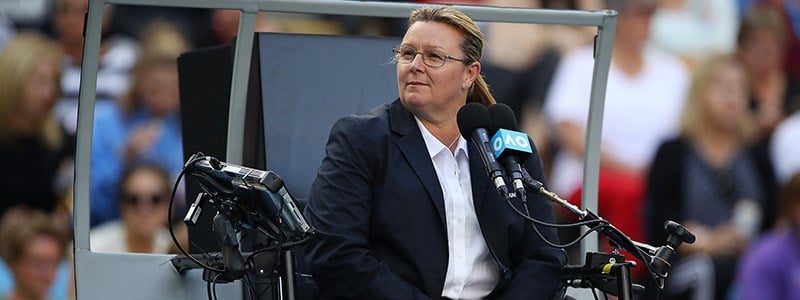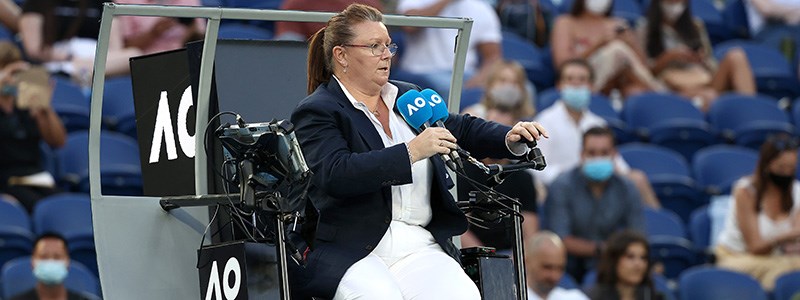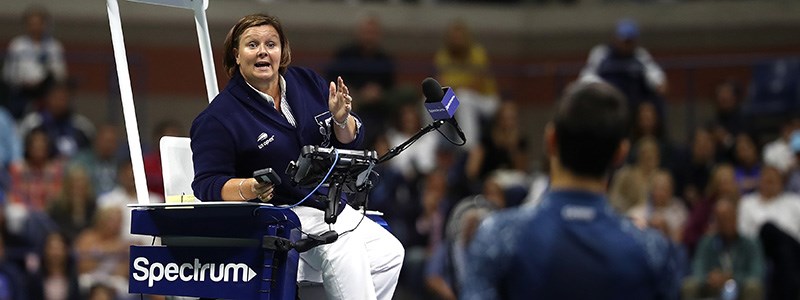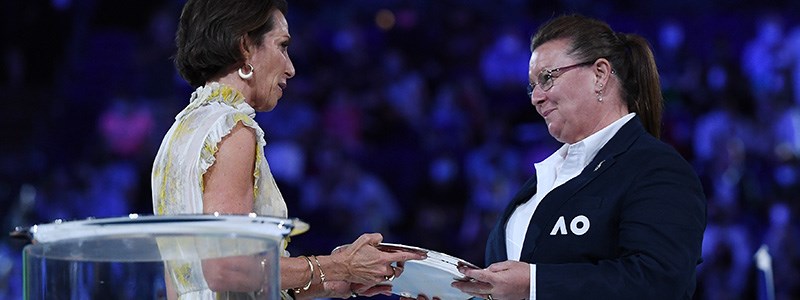
History Makers: Alison Hughes
• 4 minute read
No Brit has been to more Grand Slam singles finals, Billie Jean King Cup finals or Olympics than Alison Hughes.
Born in Newcastle Upon-Tyne, Hughes is one of the most influential figures in the modern game, having made a name for herself as one of the greatest chair umpires to have ever officiated in the sport.
Earlier this year at the Australian Open, Hughes umpired her 22nd Grand Slam final between Naomi Osaka and Jennifer Brady, adding to an illustrious resume that includes 15 Billie Jean King Cup finals, four Olympic Games and several Davis Cup ties. She is one of only two people to have chair umpired the singles finals at each of the four Grand Slam events.
Having grown up around tennis in a sporting family, Hughes first started playing as a child and would go on to start coaching as well. She represented her county at U18s level and her love and passion for the game continued to grow.

In 1991, Hughes made a decision that would change the rest of her life. In a bid to develop her knowledge of the game and discover new ways to involve herself in tennis, she decided to join the Association of British Tennis Officials and LTA Officiating.
She completed a day’s worth of training to learn the basics of becoming a line umpire and straight away caught the bug. Soon enough she had finished a year’s worth of on court experience and she was able to start working at world renowned competitions, such as Wimbledon – where she made her debut in 1993.
Fast forward to 2003 and she became a gold badge chair umpire – the highest qualification you can obtain – and was asked to join the ITF and Grand Slam Team.
The following year all the hard work and determination paid off as Hughes was named chair umpire for the 2004 Wimbledon Women’s singles final. Labelled as one of the biggest upsets in Wimbledon history, Hughes played her part in Maria Sharapova’s triumphant 6-1, 6-4 victory over Serena Williams.

In an interview with the Metro in 2019, Hughes said, “I sat in the umpire’s chair after the coin toss and realised that one of my biggest dreams had finally come true.
“I felt so proud to have been chosen for it and did my best to concentrate on not tripping over as I collected my medal from the Duke of Kent after the match.”
This would be one of many infamous moments that Hughes would have a front row seat at in the years to come.
She chair umpired her sixth Wimbledon Women’s singles final in 2015 as Serena Williams lifted her sixth of seven titles at SW19. Two years later she also officiated the last Grand Slam final between the Williams sisters at the Australian Open.
In September 2018 she broke new ground once again, becoming only the second women to chair umpire the US Open men’s final, between Novak Djokovic and Juan Martin del Potro. In doing so, she joined a list of only three women to ever chair umpire a men’s Grand Slam final, alongside Sandra de Jenken and Eva Asderaki-Moore.

Not only has she been there for some of the biggest moments in the sport, but some of the strangest as well. In 2016, Hughes gave Cypriot Marcos Baghdatis a formal warning for taking out and using his mobile phone during the change of ends in a US Open match against Gael Monfils.
On a different occasion, this time at the Hopman Cup, Hughes was asked to deliver an Espresso on court to Serena Williams after the American lost the opening set.
Then at the 2019 Australian Open, Hughes was almost badly injured after an out-of-control Spidercam veered towards her head in a match between Ashleigh Barty and Maria Sharapova. Luckily she was able to move out of the way before the camera took out the sun shield above her.

Needless to say, Hughes has been at the fabric of the professional game for the last 30 years and is a true pioneer for any aspiring umpires and officials. A testament to the game, British tennis, and herself, Hughes’ legacy will continue to grow and live on for generations to come.
Become a tennis official
If you're inspired by Alishon Hughes' story, then find out how you can get involved in tennis officiating here.





